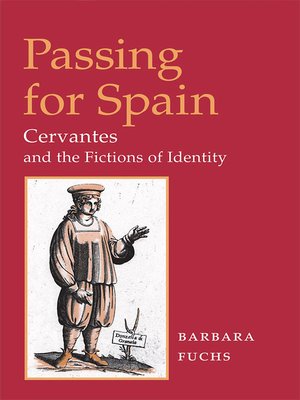
Sign up to save your library
With an OverDrive account, you can save your favorite libraries for at-a-glance information about availability. Find out more about OverDrive accounts.
Find this title in Libby, the library reading app by OverDrive.



Search for a digital library with this title
Title found at these libraries:
| Library Name | Distance |
|---|---|
| Loading... |
Passing for Spain charts the intersections of identity, nation, and literary representation in early modern Spain. Barbara Fuchs analyzes the trope of passing in Don Quijote and other works by Cervantes, linking the use of disguise to the broader historical and social context of Counter-Reformation Spain and the religious and political dynamics of the Mediterranean Basin.
In five lucid and engaging chapters, Fuchs examines what passes in Cervantes's fiction: gender and race in Don Quijote and "Las dos doncellas"; religion in "El amante liberal" and La gran sultana; national identity in the Persiles and "La española inglesa." She argues that Cervantes represents cross-cultural impersonation — or characters who pass for another gender, nationality, or religion — as challenges to the state's attempts to assign identities and categories to proper Spanish subjects.
Fuchs demonstrates the larger implications of this challenge by bringing a wide range of literary and political texts to bear on Cervantes's representations. Impeccably researched, Passing for Spain examines how the fluidity of individual identity in early modern Spain undermined a national identity based on exclusion and difference.
| Preface: Serious Play ix 1. Passing and the Fictions of Spanish Identity 1 2. Border Crossings: Transvestism and Passing in Don Quijote 21 3. Empire Unmanned: Gender Trouble and Genoese Gold in "Las dos doncellas" 46 4. Passing Pleasures: Costume and Custom in "El amante liberal" and La gran sultana 63 5. "La disimulaci6n es provechosa": The Critique of Transparency in the Persiles and "La espafiola inglesa" 87 Afterword: Passing and the Arts of Subjectification 111 Notes 115 Index 137
In five lucid and engaging chapters, Fuchs examines what passes in Cervantes's fiction: gender and race in Don Quijote and "Las dos doncellas"; religion in "El amante liberal" and La gran sultana; national identity in the Persiles and "La española inglesa." She argues that Cervantes represents cross-cultural impersonation — or characters who pass for another gender, nationality, or religion — as challenges to the state's attempts to assign identities and categories to proper Spanish subjects.
Fuchs demonstrates the larger implications of this challenge by bringing a wide range of literary and political texts to bear on Cervantes's representations. Impeccably researched, Passing for Spain examines how the fluidity of individual identity in early modern Spain undermined a national identity based on exclusion and difference.
| Preface: Serious Play ix 1. Passing and the Fictions of Spanish Identity 1 2. Border Crossings: Transvestism and Passing in Don Quijote 21 3. Empire Unmanned: Gender Trouble and Genoese Gold in "Las dos doncellas" 46 4. Passing Pleasures: Costume and Custom in "El amante liberal" and La gran sultana 63 5. "La disimulaci6n es provechosa": The Critique of Transparency in the Persiles and "La espafiola inglesa" 87 Afterword: Passing and the Arts of Subjectification 111 Notes 115 Index 137







